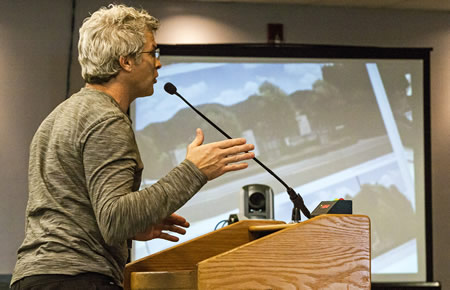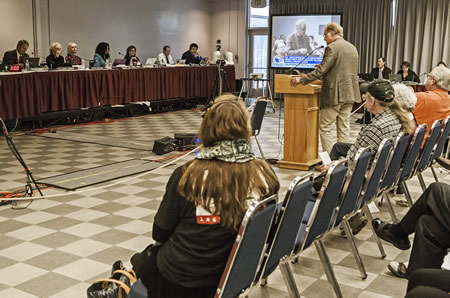Two Laguna Beach projects stymied for months by appeals to the California Coastal Commission can now move forward.

The Commission approved coastal development permits last week for Mark Christy’s makeover of the 84-acre Ranch in Aliso Canyon and for sculptor Louis Longi’s 30-unit artists’ work/live project on Laguna Canyon Road.
The Commission’s purpose, protecting and improving public access to the California coastline and preserving sensitive habitat, figured prominently in both cases. However, in voting on Longi’s project the commissioners went along with their staff’s recommendations, while in Christy’s case their final approval scaled back conditions proposed by staff but did lay the groundwork for a trail long-sought by open-space advocates.
Devora Hertz, Jackie Gallagher and Audrey Prosser, and Roger Butow filed appeals to the Coastal Commission that challenged the approval of Longi’s project by the City Council and the Planning Commission last year. The overlapping claims included contentions that the multi-unit project would adversely impact the environment, visual resources, community character and water quality; and that it fails to comply with setback requirements based on its proximity to a “blue line” stream. This last contention, about the project’s proximity to and adverse affects on the waterway, proved the main area where the Coastal staff found grounds for the appeal.
Working with them before the hearing Longi had already agreed to make changes, including removing proposed cantilevered balconies to satisfy a 25-foot setback buffer from the creek and carrying out a five-year habitat restoration plan. The agreement meets the conditions for approval, Sherliyn Sarb, the Commission’s deputy director, said.
Ultimately, both Coastal staff and commissioners seemed to agree that the city’s planners had adequately addressed questions about the project’s zoning and community character. And with the added stream and habitat protections, they embraced the project for meshing with their own affordable housing goals.
“I want to take that commitment to affordability as far as we can, so I will support the proposal as submitted,” said Commissioner Jana Zimmer.
Conversely, affordability also supported the coastal staff’s argument to impose costly special conditions on Christy’s project, the most severe of which the commission ultimately rejected.
Sarb said that development guidelines in the city’s local coastal program emphasize the need to preserve and encourage the city’s stock of affordable rooms, and Executive Director Charles Lester said staff concluded believed Christy’s remodel would in fact result in a loss of lower cost accommodations.

Lester urged the commissioners to focus their inquiry on the impact of lower cost visitor serving accommodations, habitat and public access.
Last May, the Laguna Beach Planning Commission approved a coastal development permit for renovations to the Ranch that included refiguring the hotel’s 64 rooms into 97, a restaurant makeover and the addition of a spa and fitness center.
Laguna Beach resident Mark Fudge appealed that decision to the Coastal Commission. He contended the permits were unlawful by failing to weigh the project’s impact on affordable public accommodations, parking, historical and biological resources, water quality and other issues.
Coastal staff subsequently also questioned the unpermitted transformation of a former girl scout camp at the far end of the property. The area formerly used as a storage yard by the previous owner was rechristened Scout Camp, which in recent months has served as an open-air event center.
Prior to the hearing, Christy proposed granting a floating easement for a future trail across his property that would connect a wilderness park to the ocean. And until the trail was completed by a third-party developer, he proposed an interim shuttle program. He also offered to host overnight camping experiences for non-profit youth groups.
Coastal staff found Christy’s offers insufficient. Instead, to offset their determination of a loss of low cost rooms, staff recommended that Christy both pay an in-lieu fee of $1.2 million and fund and operate a shuttle system himself until trail completion, at a cost they estimated at up to $2 million.
During testimony at the hearing in Santa Monica, open space advocates pushed for Christy to fund the construction of a trail through his property while others called for reinstating the scout camp, though it had not been used as such for 60 years. Ranch supporters, including City Manager John Pietig, Mayor Bob Whalen and Council members Toni Iseman, Kelly Boyd and Rob Zur Schmiede, urged Commissioners to consider the wide base of community support for the project and concessions proposed by Christy.
Diverging with its staff, the Coastal Commissioners voted 9-1 to scale back the staff’s proposed development conditions and quashed the demand for an in-lieu fee and shuttle service. They did require that Christy dedicate a floating easement for a public trail along the property’s north edge and agree to host at least a dozen overnight outings, of up to 40 people, for underprivileged youth annually at the former scout camp.
Commissioner Wendy Mitchell said she disagreed with extracting funds from coastal developers, but supported encouraging coastal trips for inner-city children. She found Coastal staff’s suggested conditions too punishing.
Rather than an in-lieu fee, Commissioner Greg Cox proposed that Christy contribute $250,000 towards consulting and construction fees of a trail along his easement, which was agreed to by Christy and approved by the Commission.
Based on Mitchell’s suggestion, the Commissioners also scaled back other staff recommendations, such as imposing a 65 decibel noise limit rather than forbidding amplified sound at outdoor events and accepting a 25-foot setback from the stream at the scout camp rather than requiring a 100-foot setback.
“I feel like the city did not do their job” in assessing the impact of losing affordable hotel rooms, said Commissioner Dayna Bochco, the single dissenting vote.
But many Commissioners disagreed with staff’s assessment of fewer affordable rooms and most found that loss to be adequately offset by Christy’s proposals and the addition of other amenities, such as an affordable golf course and his hosting of fundraisers for local non-profit groups.
“What is clear is that the applicant is committed to the local community and has done a lot in the way of making this a good project,” said Commissioner Effie Turnbull-Sanders.





[…] suit asks the court to order the California Coastal Commission to rescind its January 2015 decision granting a coastal development permit for Longi’s artist live work […]
[…] approving the resort’s proposed renovations in 2015, the California Coastal Commission stipulated that the […]